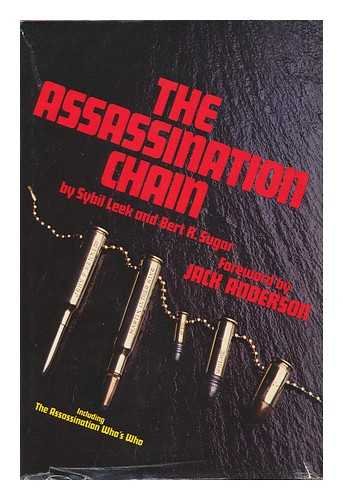Here’s a few things you should know about me.
I don’t believe in ghosts.
I don’t believe in aliens.
I don’t believe in reincarnation.
I don’t believe in manifesting events and I sure as heck don’t believe in the power of Twitter prayer circles.
I do believe that Lee Harvey Oswald acted alone.
That makes me a bit of a rarity in our conspiracy-crazed culture but, to me, the idea of one loser killing the most powerful man in the world makes more sense than the idea of some gigantic, complex conspiracy coming together and developing a needlessly complicated plot to kill someone who they could have just as easily blackmailed or circumvented through other methods.
That said, just because I don’t believe in conspiracy theories doesn’t mean that I don’t find them to be oddly fascinating. Take, for instance, the 1977 conspiracy tome, The Assassination Chain.
Written by Sybil Leek and Bert R. Sugar, The Assassination Chain takes a look at the theories surrounding the assassination of John F. Kennedy. Each major theory — from Oswald acting alone to accusations against the CIA, the FBI, the Mafia, Castro, the anti-Castroites, the military-industrial complex, and various right-wing oilmen — is given its own separate chapter. With the exception of the official story, each theory is given respectful consideration. After detailing the JFK theories, The Assassination Chain features chapters about the assassinations of Martin Luther King, Jr, and Robert F. Kennedy. It even takes a look at the attempted assassination of George Wallace and suggests that both Sirhan Sirhan and Arthur Bremer were brainwashed by people who were concerned that either RFK or Wallace could keep Nixon out of the White house.
And, in conclusion, the book suggest that the guilty party was …. EVERYONE! Everyone from the CIA to the FBI to the Mafia to the Pentagon to the richest men in Texas came together in a gigantic plot to not only kill JFK but to also to kill Rev. King, RFK, and Wallace. (I think this might be the only book to suggest that MLK and George Wallace had the same enemies.) Who could stand at the controls of such a plot? Almost as an afterthought, the book accuses Howard Hughes, the famously eccentric billionaire who was later played by Leonardo DiCaprio in The Aviator.
The book’s conclusions aren’t particularly convincing but they do provide an interesting insight into the conspiracy mindset, which states that the only evidence that matters is the evidence that supports the conclusion that you’ve already reached. There’s actually far more evidence to suggest that Oswald acted alone than there is to suggest that the CIA would risk its existence by assassinating the President as opposed to just threatening to leak the details of the President’s extramarital affairs to the press. But it’s comforting to assume that the world’s events are the result of a conspiracy as opposed to just the act of one loser who was upset because his wife left him. Conspiracies provide a way to understand the whims of fate. There’s a comfort in believing that everything happens as a part of a deliberate chain as opposed to just being random events.
The thing is, though, The Assassination Chain makes for an interesting read. Regardless of whether you buy the conspiracy angle or not, it’s always interesting to explore the darker corners of the 60s and early 70s. One reason why the JFK assassination conspiracy theories are so fascinating is because they all involve shady and downright weird characters, like alcoholic ex-FBI agent Guy Bannister and his partner, a hairless pilot and amateur cancer researcher named David Ferrie. The Assassination Chain provides a tour through the fringes of the 60s and introduces to many of the characters who were made their home in those fringes. The book’s final chapter is a detailed Who’s Who of everyone who, up to that point, had been caught up in the assassinations and the theories that followed and it’s an interesting collection of eccentrics, wannabe spies, and mentally unstable blowhards.
The worn and beat-up copy of this book that I read was obviously an old library book. It reeked of cigarette smoke and, as I leafed through the book last week, I found myself imagining the previous owner, chainsmoking while trying to understand the chaotic and random nature of the world. Whomever that person was, I hope they found some sort of answer.
